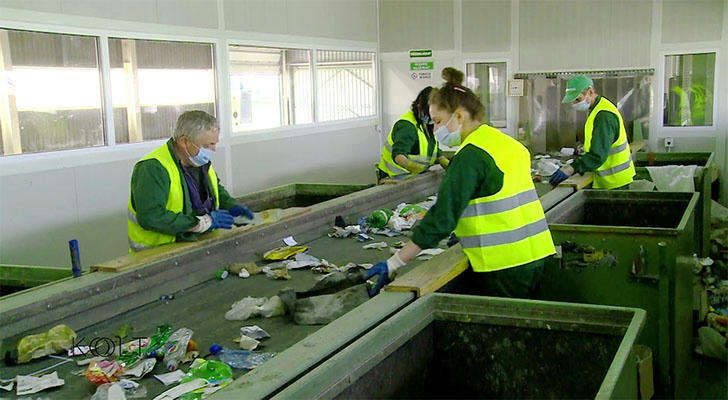How to Become a Waste Sorter: A Step-by-Step Guide

Waste sorters are essential in protecting our environment. By sorting waste into different categories, they help reduce landfill waste and promote recycling, which minimizes pollution. If you're interested in becoming a waste sorter, this guide will outline the necessary steps, responsibilities, and career opportunities in this important field.
Key Responsibilities of a Waste Sorter
As a waste sorter, your main tasks will include:
1. Sorting Waste: Manually or using equipment to separate different types of waste, such as plastic, metal, paper, and electronic items.
2. Identifying Recyclables: Picking out recyclable materials from mixed trash to ensure they are reused.
3. Handling Hazardous Waste: Recognizing and properly managing harmful waste, like batteries and chemicals, to keep everyone safe.
4. Operating Equipment: Using machines such as conveyor belts and compactors to assist with the sorting process.
5. Maintaining a Clean and Safe Workplace: Keeping the work area tidy and adhering to safety rules to prevent injuries.
Basic Requirements to Become a Waste Sorter
To become a waste sorter, you generally need the following qualifications:
1. Education: A high school diploma is usually not required, but basic reading and understanding skills are essential.
2. Physical Fitness: Good physical health is necessary, as the job involves standing for long periods, bending, and lifting objects.
3. Attention to Detail: Careful sorting is crucial to ensure materials are classified correctly.
4. Basic Recycling Knowledge: Familiarity with how different materials should be sorted is beneficial.
5. Teamwork Skills: You should be able to collaborate effectively with others.
6. Safety Compliance: Following safety protocols is essential to avoid accidents.
Training for Waste Sorters
The training program for waste sorters typically includes:
1. Waste Sorting Education: Learning to identify recyclables, hazardous waste, and non-recyclable materials.
2. Safety Training: Understanding how to use protective gear and follow safety guidelines to prevent injuries.
3. Equipment Operation: Training on how to use machines that aid in the sorting process.
4. Health and Environmental Awareness: Gaining knowledge on maintaining personal health and understanding the environmental importance of waste sorting.
5. Efficiency Improvement: Learning techniques to sort waste quickly and accurately.
Career Development Path for Waste Sorters
The typical career progression for waste sorters is as follows:
1. Entry-Level Sorter: Starting with basic sorting tasks while gaining experience.
2. Senior Sorter: Becoming more skilled and taking on more complex tasks, possibly mentoring new employees.
3. Team Leader or Supervisor: Overseeing a small team, assigning tasks, and ensuring safe and efficient work practices.
4. Management or Environmental Project Manager: Moving into management roles at waste processing centers or leading environmental projects.
5. Continuing Education and Certification: Pursuing further training or certifications to advance in the field.
Support and Opportunities for Career Development
Waste sorters can benefit from various supports and opportunities for growth:
1. Ongoing Training: Many companies offer training to keep employees updated on recycling practices and technologies.
2. Professional Certification: Certifications in waste management can enhance job prospects and lead to higher positions.
3. Learning New Technologies: Adapting to new equipment helps sorters improve their skills and efficiency.
4. Promotion Opportunities: Experienced sorters can move up to leadership roles.
5. Growing Industry: The expanding environmental sector creates more job opportunities in recycling and resource management.
Salary and Benefits for Waste Sorters
The salary and benefits for waste sorters can vary based on location and experience. Here’s an overview:
1. Salary Levels:
• Starting Salary: Typically, waste sorters begin at or slightly above minimum wage.
• Experience Matters: Salaries increase with experience; senior sorters and team leaders earn more.
• Location Differences: Salaries are often higher in developed regions with strict recycling laws.
2. Benefits:
• Health Insurance: Many employers provide health insurance for medical costs and accidents.
• Retirement Plans: Some companies offer savings plans for retirement.
• Safety Equipment: Employers supply protective gear and training.
• Paid Time Off: Many offer paid vacation, sick leave, and holidays.
• Job Stability: With rising environmental awareness, job security in waste management is strong.
3. Bonuses and Incentives:
Some employers offer performance-based bonuses to motivate sorters.
Practical Steps to Get Started
If you want to become a waste sorter, follow these actionable steps:
1. Research Local Opportunities: Find waste management companies in your area that are hiring.
2. Prepare Your Resume: Highlight relevant skills, such as teamwork and physical stamina, even if they aren’t directly related to waste sorting.
3. Apply for Entry-Level Positions: Look for entry-level sorting jobs and be ready to learn.
4. Engage in Training: Take advantage of any training provided by your employer to enhance your skills.
5. Network: Connect with other professionals in the field to learn and discover job opportunities.
6. Consider Certification: Explore certification courses in waste management to improve your qualifications.
7. Stay Informed: Keep up with industry news and trends in waste management to stay competitive.
Conclusion
Waste sorters are vital in protecting the environment by reducing pollution and promoting recycling. With growing environmental awareness, the waste management industry is expanding, creating more job opportunities. If you’re interested in environmental work, becoming a waste sorter is an excellent starting point with many avenues for career advancement. The future of this field looks promising, especially with the introduction of new technologies and green policies, making it a worthwhile career choice.
